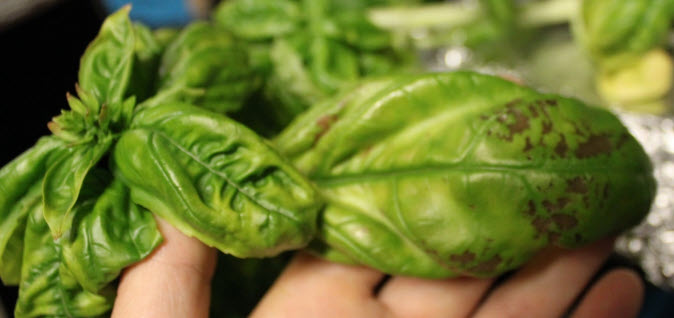How To Identify A Nutrient Deficiency In Hydroponic Basil
Fertilizer designed specifically for use on hydroponic crops plays a vital role in mitigating hydroponic nutrient deficiency. This is certainly the case when it comes to basil (Ocimum basilicum). Did you know it’s the most-grown greenhouse herb crop?
If you are growing basil, it’s essential for you to understand how to identify nutrient deficiencies. Research from Cornell University* provides a thorough outline of how to identify deficiencies in hydroponic basil. Below, We’ll touch upon basil’s sensitivity to magnesium and outline how to identify general hydroponic nutrient deficiencies found in basil.
About Hydroponic Basil Nutrient Deficiencies
Basil is sensitive to magnesium deficiency more than other types of nutrient deficiencies. In hydroponic production, Magnesium (Mg) stands as one of the vital elements included in a comprehensive nutrient solution. Nonetheless, it’s worth noting that the supply of Mg might not always meet the plant’s demand. This is especially evident in basil, where it appears to necessitate a higher concentration of Mg compared to leafy greens. Make sure to use a water-soluble fertilizer that has enough magnesium for basil plants.
How To Identify A Nutrient Deficiency In Hydroponic Basil
While visual diagnosis is important, it is crucial to understand that many nutrient deficiencies can have similar appearances. Therefore, conducting laboratory leaf tissue analysis becomes necessary to precisely identify these symptoms. Additionally, it’s essential to acknowledge that the timeline for symptom development may vary depending on the current environmental conditions.
Here are the general hydroponic nutrients and signs of nutrient deficiency in basil plants:
- Nitrogen (N): Nitrogen deficiency can cause uniform chlorosis (yellowing) of older leaves, along with reduced plant size overall.
- Phosphorus (P): Phosphorus deficiency appears as small purple spots on older leaves. These purple areas usually become larger.
- Potassium (K): You will see necrotic spots between the veins of the oldest leaves on the plant. They become more visible over time.
- Calcium (Ca): The symptoms of calcium deficiency are necrotic spots near the base of young leaves, along with downward cupping of the leaves.
- Magnesium (Mg): Magnesium deficiency first appears as faint yellowing of mature leaves, progressing to interveinal necrosis. This can then be seen on younger leaves.
- Sulphur (S): Plants show uniform yellowing across the leaf blade on all leaves. The plant size tends to be much smaller.
- Iron (Fe): You will see interveinal yellowing of the upper leaves while the lower leaves stay green.
- Boron (B): Boron deficiency shows faint necrotic regions between the veins on the base of young leaves and develops yellowing over time. Plants also tend to have a smaller root system.

Take A Proactive Approach When Applying Nutrients Solutions for Hydroponic Basil
Taking a more proactive approach to caring for your hydroponic basil plants is always best. To prevent economic losses caused by nutritional disorders, it is advisable to frequently monitor growing media and nutrient runoff. If needed, adjustments can be made to the water-soluble fertilizer regime to ensure a sufficient and appropriate supply of nutrients. This proactive approach will help optimize plant health and productivity, minimizing the risk of nutrient-related problems that could lead to financial losses. Be sure to check out our hydroponic nutrients, designed specifically for herbs and leafy greens:
- Plant-Prod 7-11-27 HydroVeg Water Soluble Fertilizer
- Plant-Prod 6-11-31 Hydroponic Water Soluble Fertilizer
Mattson, N. and T. Merrill. 2016. Symptoms of common nutrient deficiencies in hydroponic basil. e-Gro Research Update #2016.04. 10 pp.
For more fertilizer productivity tips, check out these blog posts:
- What is the impact of using a reclaimed water irrigation system on fertilizer?
- Symptoms of Common Nutrient Deficiencies in Hydroponic Lettuce & How to Fix Nutrient Deficiencies
- Using a Two-Part A&B Cannabis Nutrient System: Alternate vs Simulantenous Feedings
Plant-Prod manufactures water-soluble fertilizers for fruit trees, plants and flowers. The choice of growers from California to Maine for over 70 years, Plant-Prod fertilizers are made from the finest raw ingredients in the world, tested constantly for purity and turbo-milled to ensure 100% solubility in order to help you improve yields while cutting fertilizer costs. Click here to find a Plant-Prod fertilizer supplier near you.
